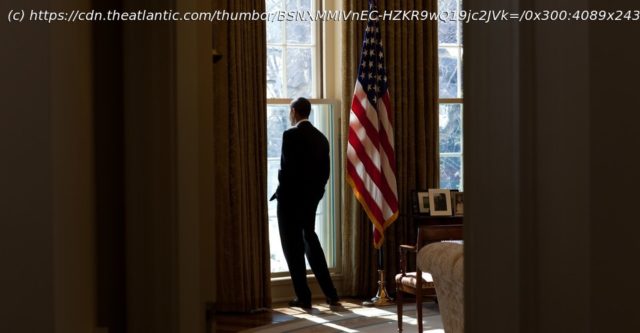The former president’s detachment allowed him to see the emerging political landscape before others did—and kept the presidency from extinguishing his literary light.
Autobiographies of famous people are almost always disappointing. The demands of public life degrade literary prose: the euphemisms, evasions, forced optimism, and name-checking; the pressure to please different constituencies; the need to project one’s personality onto a huge stage; the relentless schedule, the lack of time alone. Living with one eye on popular opinion and the other on history kills the inwardness without which writing turns into making statements. The great can’t afford to be honest. Too much of anyone’s life is failure and disappointment; too much of greatness has the smell of monomania. No—they have to learn from every setback, move on to the next “challenge,” find inspiration in ordinary people, and if they had it to do all over again, they wouldn’t change a thing. The masks they wear become their faces. Even the words they write themselves sound ghostwritten. If Abraham Lincoln had outlived his presidency, he might have left us a wise and brooding masterpiece. John F. Kennedy’s would have been rich with irony and a sense of history. But the autobiographies of recent presidents are all pretty forgettable. The one presidential memoir that became a classic—Personal Memoirs of U. S. Grant—is overpraised by people who haven’t read it. Grant’s talent as a writer consists of the same quality that made him a great general: his dogged attention to the task at hand. What he lacked in self-reflection, he made up for in subject matter. The first volume of Barack Obama’s memoirs puts to the test whether a good writer can survive being president. Obama entered politics as a writer, not the other way around. Dreams From My Father, published in 1995, when he was 33, tells of his search for identity and meaning as the son of a white woman from Kansas and a Black man from Kenya. By almost any standard, it’s an exceptional first book, restless and subtle and driven by a deepening self-knowledge. The story ends shortly before Obama enters the hard world of Chicago politics in the mid-90s—not an obvious destination for the book’s sensitive protagonist. Years later, during his 2004 Senate race, Obama told a magazine journalist following him around Illinois that he’d like to trade places for a day and be the one observing and taking notes. This tension between the writer and politician, the dreamer and activist, detachment and involvement—“wanting to be in politics but not of it”—plays out in one form or another all through Obama’s career, and in his new memoir. A Promised Land is indisputably a book by the author of Dreams From My Father. There’s the same capacity for self-awareness and self-criticism, the talent for description and narrative pacing, the empathy and wry asides. The best passages—such as those describing Obama’s political rise from Chicago to the Iowa caucus and the Democratic nomination in 2008—have the fresh energy of experience the author has longed to revisit. The bigger the politician gets, the harder the writer has to struggle to stay in command of the story. In the account of Obama’s presidency, which ends with the raid that killed Osama bin Laden in 2011, the narrative voice disappears for long stretches of policy debates, historical contexts, and foreign trips. “I’m painfully aware that a more gifted writer could have found a way to tell the same story with greater brevity,” Obama admits in the preface. But somehow, through a decade and a half of intense exposure, speeches, interviews, meetings, briefings, and galas, the ex-president has preserved his inner life, and with it his literary light. That tension between the public figure and the private man is one of the new book’s main themes. It’s evident in the way Obama experiences the sudden and persistent strangeness of the office—how “my first name all but disappeared,” how everyone stood whenever he entered a room, how unnatural his imprisonment in the White House and even on trips outside the gates felt.






